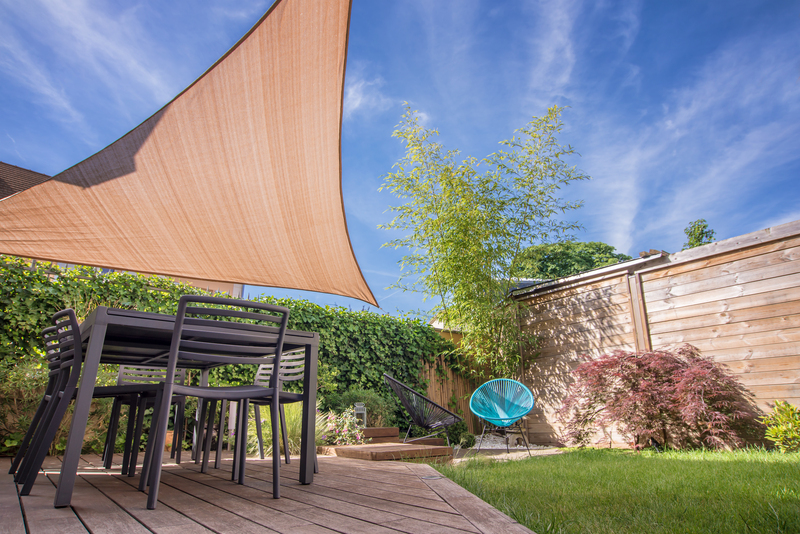Innovative Ways to Develop a Safe Garden Haven for Kids
Posted on 05/06/2025
Innovative Ways to Develop a Safe Garden Haven for Kids
Turning your garden into a safe garden haven for kids is a rewarding endeavor for any parent or guardian. Not only does it offer children a unique opportunity to explore, play, and learn in a natural environment, but it also gives peace of mind knowing they are secure and protected. In today's world, creating an engaging outdoor space that's also safe is essential. Let's dive into creative and effective strategies to transform your backyard into the perfect kid-friendly sanctuary.
Why Design a Kid-Friendly and Safe Garden?
The importance of outdoor play in children's growth cannot be overstated. A thoughtfully designed garden sanctuary:
- Encourages physical activity, imagination, and creativity
- Promotes emotional well-being and stress relief
- Improves social skills as kids play together
- Teaches them about nature, sustainability, and responsibility

1. Selecting the Right Location and Layout
The foundation of a child-safe garden is its layout. Considerations include:
- Visibility: Choose spots that are easily observable from inside your home.
- Sun and Shade: Ensure there are shaded areas to protect children from excessive sun exposure.
- Traffic Flow: Design clear pathways to direct foot traffic and minimize trip hazards.
Smart Zoning for Safety and Fun
- Play Zone: Dedicated space for playground equipment and active play.
- Learning Nook: A quiet area with seating for crafts, reading, or nature observation.
- Green Space: Lawns or garden beds for barefoot exploration and gardening activities.
2. Rethinking Boundaries: Fences, Gates, and Barriers
Proper fencing is crucial for a secure kids' garden. Choose fencing that:
- Is tall and robust enough to keep children in and intruders out.
- Has smooth edges and surfaces to prevent injuries.
- Uses childproof latches on all gates.
- Features vertical panels to deter climbing.
3. Innovative Surfacing Materials for a Soft Landing
Hard surfaces like concrete and stone pose risks for running, jumping, and roughhousing kids. Consider innovative ground covers such as:
- Rubber mulch or interlocking mats: Cushions falls and minimizes injury risk.
- Bark chips or sand: Soft, natural, and easy to maintain.
- Artificial turf: Durable, low maintenance, and provides an even, cushioned surface.
4. Choosing Non-Toxic, Child-Safe Plants
A truly safe children's garden must be free from harmful plants. Here's how to build a lush, safe botanical wonderland:
- Avoid plants such as foxglove, oleander, yew, or datura, which are highly toxic.
- Choose edible and sensory plants like strawberries, sunflowers, snapdragons, mint, and basil.
- Teach kids about plant safety and always supervise younger children during planting or harvesting.
- Label all plants to help children learn and stay alert about what not to touch or taste.
5. Integrating Creative & Safe Garden Play Structures
Innovative play equipment transforms a simple yard into an adventurous kids' garden haven. When selecting or designing:
- Pick rounded edges and sturdy construction to minimize risks.
- Add imaginative elements such as fairy gardens, interactive stepping stones, or musical panels.
- Use untreated wood or safe plastics that withstand weather and are free from toxins.
- Secure anything that could tip, and conduct regular safety checks.
For a personalized touch, try DIY projects like a bamboo teepee, sensory mud kitchen, or water play table--made from upcycled materials for sustainability.
6. Water Features: Making Them Fun but Safe
Water offers endless fascination, but requires careful planning for safety:
- Opt for shallow, recirculating water tables or splash pads instead of traditional ponds.
- Never leave standing water unattended, and always supervise children nearby.
- Cover or fence off any existing ponds or pools with secure barriers and childproof gates.
- Teach children about water safety as part of their outdoor play education.
7. Garden Lighting and Visibility Enhancements
Extending the use of your kids' garden haven into the evening requires:
- Installing soft, low-voltage LED lighting along pathways and play areas to reduce tripping in low light.
- Using solar-powered garden lights for energy efficiency and to avoid electrical hazards.
- Highlighting all steps, edges, or elevation changes with clear markings or glowing stones.
8. Minimizing Pesticide and Chemical Risks
Nothing disrupts a safe outdoor haven faster than toxic substances.
- Opt for organic gardening methods--hand-pull weeds, use natural repellents, and introduce beneficial insects like ladybugs.
- Store all gardening chemicals in locked sheds, out of sight and reach of children.
- Educate children about not touching or tasting unknown substances.
9. Allergy-Proofing and Sensitivity Considerations
Create a haven for children with allergies or sensitivities with these tips:
- Choose plants that are low in pollen, such as pansies, begonias, and hostas.
- Avoid strong-scented flowers and keep lawns trimmed to minimize pollen exposure.
- Offer shaded rest areas for kids with sun sensitivity or heat intolerance.
10. Innovative Edible Gardens for Kids
Transform small garden corners into interactive learning labs with:
- Raised beds or container gardens: Make harvesting easier for small hands and deters trampling.
- Colorful vegetables and herbs: Cherry tomatoes, rainbow chard, peas, and strawberries engage all senses.
- Encourage kids to participate in sowing, watering, and harvesting to deepen their connection with food.
- Educate children on composting and recycling to foster environmental stewardship.
11. Outdoor Furniture and Accessories: Comfort and Safety Combined
Select child-sized outdoor furniture and garden accessories for a creative sanctuary:
- Furniture with rounded edges, non-metallic and splinter-free surfaces to prevent injury.
- Picnic tables, hammocks, bean bag chairs under tree canopies for shade and comfort.
- Weatherproof storage bins to keep toys and gardening tools organized and out of walkways.
- Use brightly colored, washable cushions to invite relaxation and reading outdoors.
12. Regular Maintenance & Ongoing Supervision
The best-designed garden loses its safety edge without consistent care and supervision:
- Routinely check for broken equipment, sharp edges, or loose fittings.
- Prune overgrown plants and eliminate tripping hazards on walkways and lawns.
- Dispose of fallen fruit and berries that could become slippery or attract pests.
- Supervise children, especially younger ones, during outdoor playtime and teach them safe behaviors.

13. Innovative Garden Activities to Keep Kids Engaged
A safe child's outdoor haven should inspire new daily adventures. Ideas include:
- Create a scavenger hunt trail with clues and natural treasures to discover.
- Set up a butterfly garden or insect hotel to observe creatures up close.
- Organize themed garden parties (fairy tales, dinosaurs, explorers) to spark imagination.
- Implement nature art stations with easels, plant rubbings, and mud sculptures.
Conclusion: Crafting Your Unique Safe Garden Retreat for Kids
Developing a safe garden haven for children incorporates more than just removing obvious hazards. It's about proactively designing each detail for fun, learning, and security. Whether you have a sprawling backyard or cozy urban space, innovative solutions--paired with ongoing supervision and maintenance--will ensure your garden is both magical and safe for kids to thrive in.
By focusing on child-friendly landscaping, sturdy equipment, edible and non-toxic plants, creative activities, and regular upkeep, you encourage outdoor exploration and foster a lifelong love of nature in your little ones.
Begin your journey today--and watch your garden transform into a cherished sanctuary where play and safety go hand in hand!

